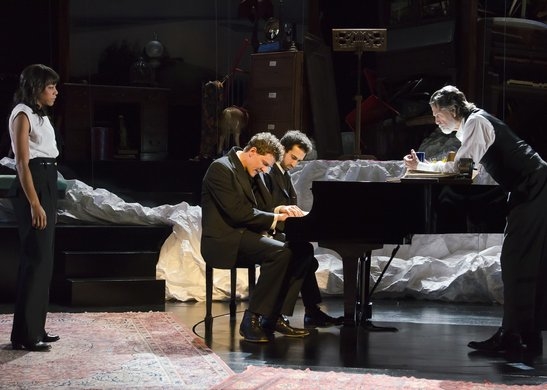Preludes

(© Kyle Froman)
Dave Malloy's oeuvre of Russian melancholy continues with Preludes, a fantastical look inside the mind of composer Sergei Rachmaninoff (played by Tony winner Gabriel Ebert), now running at Lincoln Center's Claire Tow Theater. Malloy and his creative team, including director Rachel Chavkin, reprise the collaboration that produced the wildly successful Natasha, Pierre & the Great Comet of 1812, an electro-pop opera based on Leo Tolstoy's War and Peace. With an adaptation of one of the densest novels in literary history under his belt, Malloy would seem to have no bounds to his theatrical magic. But even he, in all his dark imaginings, can do only so much to captivate with a tale of crippling writer's block.
It's 1900 in Moscow and Rachmaninoff is in the midst of a three-year dry spell after a disastrous premiere of his First Symphony. The under-rehearsed orchestra was conducted by an inebriated Alexander Glazunov, and the piece was brutally panned by influential critic César Cui, leaving the composer with suffocating self-doubt and an overwhelming fear that his first hit, "Prelude in C-sharp minor" (which he wrote as a teenager) would be his career's first and last success. To pull himself out of his creative abyss, he starts visiting hypnotherapist Nikolai Dahl (the enthralling Eisa Davis) who takes him on a psychological tour of these past traumas and eventually opens him up to write his now-famous Piano Concerto No. 2 in C minor.
With little plot to speak of, Preludes is largely a meditation on the insular world of an artist. And like the insular experience itself, the show is alternately enlightening and tiresome. As experts on the torturous artistic existence, Malloy and Chavkin find an intriguingly theatrical way to translate the experience of writer's block to the stage in all its arduous and disorienting glory (depicted with an eerie heft in Ebert's opening number, "Your Day"). The stage (designed by Mimi Lien) is a confused jumble of furniture, instruments, and anachronistic props (including a fridge filled with Chinese takeout containers) while Malloy's tunes share the same pop-influenced irreverence that helped Natasha, Pierre straddle its period and contemporary identity (Paloma Young's costumes crudely suggest the turn-of-the-century time period as well).
Chavkin's direction of the strobe-lit sequence (lighting design by Bradley King) reenacting the fateful symphonic performance, lends the show its most visually and emotionally stunning moment, due in no small part to Ebert's brilliant lack of restraint as the spiraling and heavily perspiring composer. But then, as "Rach" meanders through his raw past and stifled present, encountering the likes of Chekhov, Tchaikovsky, and Tolstoy (among other Russian figures playfully portrayed by Chris Sarandon), we the audience sink into his life's lulling monotony and our interest unfortunately begins to waver.
The plot point meant to drive us forward is Rach's impending marriage to his first cousin Natalya, a frustrated fiancée played with endearing earnestness by Tony winner Nikki M. James. While the composer struggles to break down his mental barricade, Natalya constantly reminds him of their upcoming audience with the Czar (also Sarandon) who must give the relatives license to wed. Their love story is sweet and hits a particularly poignant note as their affections are explained via a performance of a Beethoven piece for piano four hands. Music plays a significant role in Rach's life with Natalya, a piano teacher herself. And yet, his romantic trials and professional struggles never fully converge, leaving us with two partially completed story lines — each compelling in its own way but neither quite whole nor perfectly complementary.
Malloy strikes a much finer musical balance than the play's dueling trajectories as he arranges and interprets Rachmaninoff's melodies, though many of the classical pieces are allowed to stand alone thanks to the lush baritone of Joseph Keckler (who plays Russian opera singer Feodor Chaliapin) and the virtuosic Or Matias (who performs as Rachmaninoff's piano-playing alter ego). Malloy's solo compositions, however, fade into the Russian furniture as soon as you leave the theater — a disappointing follow-up to Natasha, Pierre, whose earworms lingered for days. Perhaps a comparison to past success is not the most sensitive route to take, considering the play's premise, but it's safe to say that this creative team has not written its final "Prelude."











